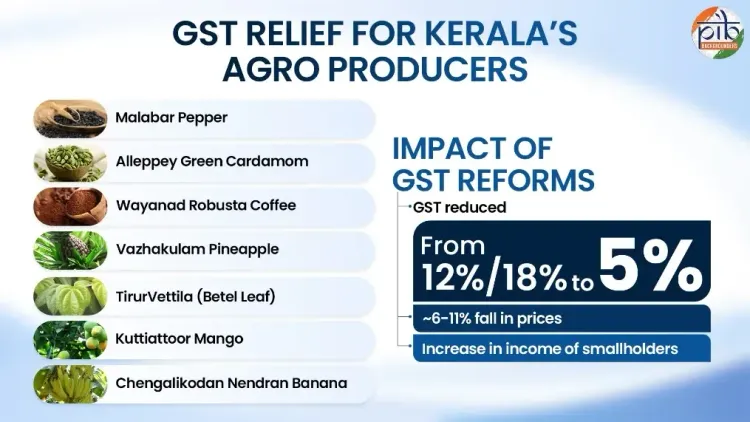Will GST Reforms Transform Kerala's Economy from Spice Gardens to Cashew Corridors?

Synopsis
Key Takeaways
- The GST reforms have lowered tax rates significantly across various sectors in Kerala.
- Cashew processing, instant coffee, and spices are among the most affected industries.
- The reforms aim to enhance affordability and competitiveness in local and international markets.
- Women make up 80% of the workforce in Kerala's coir industry, a vital sector for local employment.
- Overall, these changes are expected to positively impact the livelihoods of many in Kerala.
New Delhi, Oct 8 (NationPress) Kerala's spice, coir industry, and food-processing sectors are poised for significant enhancement following recent reforms in the goods and services tax (GST), which have lowered rates on various essential products, according to a government announcement made on Wednesday.
The adjustments in GST rates have led to reductions in costs by as much as 11 percent for cashew processing, spices, including Malabar pepper, and instant coffee, thereby improving profit margins for both producers and processors throughout the state, as stated by officials.
These rate reductions are anticipated to increase affordability for products and services, enhance export competitiveness, and bolster income opportunities across the entire value chain.
"From the spice gardens of Idukki and Wayanad to the coir factories in Alappuzha, the fisheries hubs in Kochi and Kannur, and the cashew corridor in Kollam, every region of Kerala stands to benefit. The reforms not only apply to goods but also to services, with tourism, Ayurveda, and wellness sectors receiving tax relief, making them more affordable and appealing globally," the statement emphasized.
The new GST brackets have decreased taxes on cashew processing from 12 percent and 18 percent to 5 percent; instant coffee and its preparations from 18 percent to 5 percent; Malabar pepper from 18 percent to 5 percent; extracts and masala mixes from 18 percent to 5 percent; and processed pineapple products from 12 percent to 5 percent.
Kerala's cashew processing industry caters to domestic snacking and gifting markets, with products becoming more accessible under the new GST structure, the statement affirmed. The rate cut enhances the competitiveness and profit margins of Kerala's cashew processors.
Moreover, the GST reforms are projected to improve the price competitiveness of Kerala's pepper in international markets and fortify the position of smallholder farmers in the spice value chain.
The coir sector, which includes GI-tagged Alleppey Coir products like mats, matting, ropes, and geotextiles, is also expected to experience a cost reduction of 11 percent. The coir industry employs approximately 370,000 individuals, with women constituting about 80 percent of the workforce, as noted in the statement.









